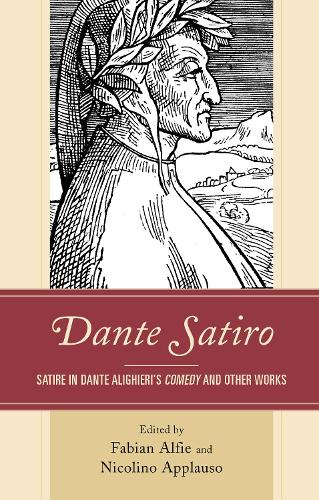
Dante Satiro: Satire in Dante Alighieri's Comedy and Other Works
(Paperback)
Available Formats
Publishing Details
Dante Satiro: Satire in Dante Alighieri's Comedy and Other Works
By (Author) Fabian Alfie
Edited by Nicolino Applauso
Bloomsbury Publishing PLC
Lexington Books
21st December 2021
21st December 2021
United States
Classifications
Professional and Scholarly
Non Fiction
Poetry / Poems
851.1
Physical Properties
Paperback
262
Width 155mm, Height 218mm, Spine 14mm
376g
Description
This collection of essays is the first comprehensive study on Dante and satire within his entire corpus that has been published. Its title evokes the moment when Virgil leads Dante through Limbo, the uppermost portion of Hell. There, they are joined by four classical poets, and Virgil describes one of them as Horace the satirist (Orazio satiro, 4:89). By applying the expression to Dante himself, this volume seeks to explore the satirical elements in his works. Although Dante is not typically described as a satirist, anyone familiar with his works will recognize the strong satirical element in his many writings. Ultimately, this study shows that Dante engages in satire in order to attain the primary literary tool at his disposal for his prophetic objectives: the castigation of vice.
Reviews
The essays in this volume examine satire in Dantes Divine Comedy, lyric poetry, and prose works. Alfie (Univ. of Arizona) and Applauso (Loyola Univ. Maryland) understand satire as the genre dedicated to the reprehension of vice (p. 3). The editors' introduction will be much appreciated since it both positions the volume within Dante criticism and provides a brief accessible overview of medieval European understandings of satire. The volume is divided into two parts: the first (four essays) focuses on the Comedy, and the second (also four essays) looks at satire in the minor works. Highlights among the essays include a reassessment of Paradiso 27 by Maggie Fritz-Morkin (Univ. of North Carolina at Chapel Hill) and a novel analysis of satire in the De vulgari eloquentia by Anthony Nussmeier (Univ. of Dallas). The volume finishes with a lighthearted essay by Arielle Saiber (Bowdoin College) exploring how Dante has become an enduring reference in modern popular culture and humor. Summing Up: Recommended. Upper-division undergraduates through faculty.
* Choice *A well-rounded study that fleshes out one of the most contemporary aspects of Dantes work: its use of satire as a means to reprehend vice and establish ethical values. Alfie and Applauso have put together an excellent volume with international reach, probing the classical, medieval, and ever-current aspects of the great poets satirical art. From the rotten pit of Hell to the celestial heights of Paradise, Dante spares no one and pulls no punches, targeting popes and emperors in both the Divine Comedy and his other works. Dante Satiro collects captivating readings by top Dante scholars, each of whom offers a compelling analysis of satire from the Middle Ages to its resonances with todays media satirists: seven hundred years after his death, Dante is alive and well. Indeed, as one contributor to this volume reminds us, we should keep in mind Osip Mandelstams words: It is unthinkable to read the cantos of Dante without aiming them in the direction of the present day They are missiles for capturing the future. -- Francesco Ciabattoni, Georgetown University
We all know a lot about Dante comico and his style. But on the other hand no one has ever tried to read his works as belonging to satirical genre, as if he used the poetic code as a way to struggle with the vices of his time. This is what Dante Satiro: Satire in Dante Alighieri's Comedy and Other Works is made up of for the first time, not only relating to his masterpiece (the Commedia), but also looking for a satirical tone where its not expected, like in the linguistic treaty De vulgari eloquentia, or pointing out his influence on contemporary satire. -- Marco Berisso, University of Genova
Author Bio
Fabian Alfie is professor of Italian at the University of Arizona.
Nicolino Applauso is visiting assistant professor of Italian at Loyola University Maryland.
